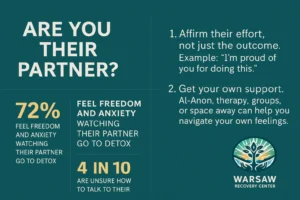Your partner finally agreed to enter drug detox. Maybe it happened quietly, after a difficult night. Maybe it took an ultimatum. Or maybe they made the choice on their own.
Either way, here you are—watching them step into treatment. And maybe for the first time in a long time, you have to stop fixing, managing, or saving. That can feel both like a relief… and like losing your grip on everything.
At Warsaw Recovery Center, we work with people in detox—and the people who love them. If you’re a partner, spouse, or long-term support person, this blog is for you. You’ve carried so much for so long. Here’s how to stay close, support their recovery, and still honor your own well-being.
You can also visit our drug detox program in Warsaw, Virginia to learn what this first phase of treatment includes.
What is drug detox, really?
Drug detox is not the whole recovery process—it’s just the beginning.
Detox is the medical process of safely helping someone’s body withdraw from substances. Depending on the drug, this may involve:
- 24/7 monitoring of vital signs, sleep, and mood
- Medication to ease symptoms like insomnia, nausea, muscle pain, or panic
- Emotional stabilization, helping people begin to think clearly again
It can last anywhere from a few days to over a week. For some substances like benzodiazepines or opioids, withdrawal can be medically dangerous—so detox provides a safe container where nothing has to be performed, managed, or hidden.
Detox won’t resolve all the relationship issues, trauma, or behavioral patterns. But it’s the step that makes everything else possible.
What do I say to them while they’re in detox?
First—if you’re not sure what to say, you’re not alone. Most partners feel unsure whether to be encouraging, firm, cautious, or quiet.
Here’s what we recommend:
- Affirm their effort, not just the outcome.
“I’m proud of you for doing this.”
“I know this isn’t easy—and I’m glad you’re getting help.” - Keep expectations grounded.
“Let’s focus on this step right now.”
“I know there’s more to figure out, but we don’t have to solve everything today.” - Don’t pressure them to be fixed.
Detox is not a finish line. It’s a place to start feeling safe again.
And if you’re still hurt, scared, or unsure? You’re allowed to say that too.
“I care about you—and I’m also still working through what this means for me.”
That honesty creates more trust than forced positivity ever could.
Should I visit or stay in contact during detox?
This depends on the facility. At Warsaw Recovery Center, contact is often limited during the first few days to help clients focus inward. That can feel hard—but it’s often helpful.
Here’s what you can do:
- Ask staff about the contact policy. Respect whatever structure is in place—it’s there to help your partner stabilize.
- Send a short note or message. Even if you can’t speak directly, a simple message like “Thinking of you, you’re not alone” can mean a lot.
- Avoid overloading them emotionally. Detox is not the time to unpack every hurt or issue. That can come later in therapy or couples support.
Silence during detox doesn’t mean your partner is cutting you out. It often means they’re finally being held by someone other than you. That’s progress—not distance.
What does drug detox feel like for them?
Your partner might look physically okay—and still be deeply unwell.
Here’s what detox can include:
- Intense mood swings
- Anxiety, depression, or emotional numbness
- Physical pain (headaches, chills, body aches)
- Trouble sleeping or eating
- Embarrassment or shame about needing help
They’re not being dramatic. They’re adjusting to life without a chemical that their body and brain have come to rely on.
If they’re short with you or seem distant, it doesn’t mean they don’t care. It means their system is in survival mode. Trust the staff to hold that process.

How can I support their recovery without losing myself?
This is the most important question. And the answer is: You take care of yourself while they take care of their recovery.
Here’s what that looks like in practice:
- Get your own support. Al-Anon, therapy, online groups—whatever helps you process your emotions without relying only on your partner.
- Don’t make recovery your new full-time job. You are not their sponsor, therapist, or safety net.
- Set boundaries early. Whether it’s about substance use, money, communication, or expectations—decide what you can hold, and what you can’t.
- Stay grounded in your truth. You’re allowed to love them and also need space. You’re allowed to cheer them on and still not know what the future looks like.
Supporting someone doesn’t mean shrinking your needs. In fact, the healthiest relationships in recovery are ones where both partners are growing.
What happens after detox?
Detox opens the door—but your partner still needs to walk through it.
After detox, most people are referred to:
- Residential treatment, for deeper healing and structured support
- Intensive outpatient programs (IOP), especially if they have work or family obligations
- Individual therapy, psychiatry, or group support to address mental health, trauma, or relapse triggers
At Warsaw Recovery Center, we offer multiple levels of care based on what’s clinically appropriate. Detox is the start of a longer journey—and staying in treatment after detox is often the strongest predictor of sustained recovery.
Should I forgive them now that they’re in detox?
You can support someone without skipping your own grief.
Forgiveness doesn’t have to happen on a timeline. You’ve been impacted. You may have felt manipulated, ignored, or abandoned while your partner was using.
You can say:
- “I’m hopeful—but I’m still hurting.”
- “I support your recovery, and I also need time to rebuild trust.”
Healing doesn’t require you to pretend nothing happened. It asks for honesty, space, and a willingness to see what’s possible going forward.
What if I don’t know if I want to stay?
That’s okay.
Entering detox doesn’t automatically repair the relationship. You’re allowed to step back, reflect, and take care of yourself first. You may decide:
- To stay and see how things go
- To create emotional or physical space
- To leave the relationship entirely
All of these are valid. Supporting someone doesn’t mean staying with them—especially if doing so costs you your safety, peace, or sense of self.
There’s no “right” answer. There’s only the truth of where you are—and that’s enough to begin.
One final reminder for partners
You didn’t cause this. You can’t control it. And you can’t cure it.
But you can:
- Hold hope without losing boundaries
- Support without self-abandoning
- Stay close without giving up your truth
Your partner is in detox now. That’s a huge first step. Let them be held by the care team. Let yourself rest. You’ve been carrying both of your lives for a long time. It’s okay to set that weight down—for a while, or for good.
Still not sure what’s next? You don’t have to figure it out alone.
Call (888) 511-9480 or visit our drug detox program in Warsaw, Virginia to learn how we support both clients and their partners through safe, compassionate care. Whether you’re standing by or stepping back, you deserve support, too.

